- Home
- Ta-Nehisi Coates
The Water Dancer Page 2
The Water Dancer Read online
Page 2
It had happened before. It had happened when I was nine years old, the day after my mother was taken and sold. I awoke that cold winter morning knowing she was gone as a fact. But I had no pictures, no memory, of any goodbye, indeed no pictures of her at all. Instead I recalled my mother in the secondhand, so that I was sure that she had been taken, in the same way that I was sure that there were lions in Africa, though I had never seen one. I searched for a fully fleshed memory, and found only scraps. Screams. Pleading—someone pleading with me. The strong smell of horses. And in the haze of it all, an image flickering in and out of focus: a long trough of water. I was terrified, not simply because I had lost my mother, but because I was a boy who remembered all his yesterdays in the crispest colors, and textures so rich I could drink them. And there I was, awakening with a start to nothing but ephemera, shadows, and screams.
I must get out. This also came to me as a feeling more than a thought. There was an ache, a breach, a stripping of me that I knew I had been helpless to prevent. My mother was gone and I must follow. So that winter morning, I put on my osnaburg shirt and pants, then slipped my arms into my black coat and tied up my brogans. I walked out onto the Street, the common area between two long rows of gabled log cabins where those of us who tasked in the tobacco field made our homes. An icy wind cut up the dusty ground between the quarters and slashed at my face. It was a Sunday, two weeks after Holiday, in the small hours just before sunrise. In the moonlight, I could see smoke rising up in white puffs out of the cabin chimneys, and behind the cabins, trees black and bare, swaying drunkenly in the whistling wind. Were it summer, the Street would have, even at that hour, been alive with garden trade—cabbages and carrots dug up, chicken eggs collected to be bartered, or even taken up to the main house and sold. Lem and the older boys would have been out there, with fishing poles on their shoulders, smiling, waving to me and yelling, “Come on, Hi!” as they headed for the Goose. I would have seen Arabella there with her brother Jack, sleepy-eyed but soon to be plucking marbles in a dirt ring they’d drawn up between two cabins. And Thena, the meanest woman on the Street, might have been sweeping her front yard, beating out an old rug, or rolling her eyes and sucking her teeth at someone’s foolishness. But it was winter in Virginia, and all in possession of good sense were huddled inside by the fires. So when I walked outside, there was no one on the Street, no one peering out the door of their quarters, no one to grab my arm, swat my bottom twice, and yell, “Hi, this cold bout to be the death of you! And where is your momma, boy?”
I walked up the winding path and into the dark woods. I stopped just out of view of Boss Harlan’s cabin. Was he part of this? He was the enforcer of Lockless, a low white who meted out “correction” when it was deemed appropriate. Boss Harlan was the physical hand of slavery, presiding over the fields while his wife, Desi, ruled the house. But when I sorted through the scraps of memory, I did not find Boss Harlan among them. I could see the water trough. I could smell the horses. I had to get to the stables. I was certain that something I could not name awaited me there, something crucial about my mother, some secret path, perhaps, that would send me to her. Walking into those woods with the winter wind cutting through me, I heard again the seemingly aimless voices, now multiplying around me—and in my mind turned again to a vision: the trough of water.
And then I was running, moving as fast as my short legs could carry me. I had to get to the stables. My whole world seemed to hinge upon it. I approached the white wooden doors and pushed up the bolt lock until the doors sprang open and knocked me to the dirt. Rising quickly and rushing inside, I found the elements of my morning vision scattered there before me—horses and the long trough of water. I came close to each of the horses and looked them in the eyes. The horses only stared stupidly back. I walked over to the trough of water and stared down into the inky blackness. The voices returned. Someone pleading with me. And now visions formed in the blackness of the water. I saw the Tasked who’d once lived down on the Street but were now lost to me. A blue mist began rising up out of the inky darkness, illuminated from within by some source. I felt the light pulling me, pulling me into the trough. And then I looked around me and saw the stable fading away, as sure as the bridge did all those years later, and I thought that this was it, the meaning of the dream: a secret path that would deliver me from Lockless to reunite me with my mother. But when the blue light cleared, I saw not my mother but a wooden gabled ceiling, which I recognized as the ceiling of the cabin I had departed only minutes before.
I was on the floor, on my back. I tried to stand, but my arms and legs felt weighted and chained. I managed to rise up and stumble over to the rope bed I shared with my mother. The sharp smell of her was still in our room, on our bed, and I tried to follow that scent down the alleys of my mind, but while all the twists and turns that marked my short life were clear before me, my mother appeared only as fog and smoke. I tried to recall her face, and when it did not come, I thought of her arms, her hands, but there was only smoke, and when I searched to remember her corrections, her affections, I found only smoke. She’d gone from that warm quilt of memory to the cold library of fact.
I slept. And when I awoke, late that same afternoon, I awoke full in the knowledge that I was alone. I have now seen a great many children in the same place I found myself in that day, orphans, feeling themselves abandoned and left open before all the elements of the world, and I have seen how some explode in tantrum while others walk in an almost stupor, how some cry for days and others move with an uncanny focus, addressing only the moment before them. Some part of them has died, and like surgeons, they know that amputation must be immediate. So that was me, that Sunday afternoon, when I rose, still in those same brogans and osnaburg, and wandered out again, this time finding my way to the storehouse where I would collect the weekly peck of corn and pound of pork deeded to my family. I brought them back to my home, but I did not stay. Instead, I retrieved my marbles, my only possession besides the sack of victuals and the clothes I was wearing, and walked back out until I reached the last building on the Street, a large cabin set back from the others. Thena’s home.
The Street was a communal place but Thena kept to herself, never joining in on the gossip, small talk, or singing. She worked the tobacco and then she went home. Her habit was to scowl at us children for playing our rowdy games within earshot or sometimes to emerge almost whimsically from her cabin, wild-eyed, swinging her broom at us. For anyone else, this would have brought conflict of some sort or the other. But I had heard that Thena had not always been this way, that in another life, one lived right here on the Street, she was a mother not just to five children of her own but to all the children of the Street.
That was another age, one I did not remember. But I knew that her children were gone. What was I thinking facing her door, holding my sack of pork and cornmeal? Surely there were others who would have taken me in, others who actually enjoyed the company of children. But there was just one on the Street who I knew understood the suffering that was just then compounding in me. Even when she swung her broom at us, I sensed the depth of that loss, her pain, a rage that she, unlike the rest of us, refused to secret away, and I found that rage to be true and correct. She was not the meanest woman at Lockless, but the most honest.
I knocked on the door and, receiving no answer and now feeling the cold, I pushed my way in. I left the ration just inside the door, then climbed the ladder to the loft, where I laid myself, looking down, waiting for her to return. She walked in a few minutes later, looked up, and gave me her familiar scowl. But then she walked over to the fireplace, started it up, and pulled a pan down from the mantel above, and within minutes the familiar smell of pork and ash-cake filled the cabin. She looked up at me once more and said, “You got to come down if you want to eat.”
* * *
—
I lived with Thena for a year and a half before I got to the precise root of her rage. On a war
m summer night I was awakened from the small pallet I maintained up in the loft of the cabin by loud moaning. It was Thena, talking in her sleep. “It’s fine, John. It’s fine.” And she spoke this with such clarity that when I first heard it, I thought she was speaking to someone present. But when I looked down from the loft, I saw that she was still sleeping. I had already gotten into the habit of leaving Thena to her ghosts, but the more she spoke, the more it seemed to me that this time she was in distress. I climbed down to rouse her. As I got closer, I heard her still moaning and talking: “It’s fine, fine, I told you. Fine, John.” I reached out and pulled on her shoulder, shaking it until she awoke with a start.
She looked up at me, and then around the dark cabin, uncertain of where she was. Then her eyes narrowed and focused again on me. I had for the past year and a half been mostly immune to Thena’s rages. Indeed, much to the relief of the Street, the rages had diminished, as though maybe my presence had begun to heal an old wound. This was incorrect and I knew it as soon as I saw her focusing on me.
“Hell you doing here!” she said. “Little rugrat, get the hell out of here! Get the hell out!” I scrambled outside and saw that it was almost dawn. The yellow spray of sun would soon be peeking over the trees. I walked back to the old cabin I’d shared with my mother and sat on the steps, until it was time for the Task.
I was eleven by then. I was a small boy for my age, but no exception was made, and I was put to work like a man. I daubed and chinked the cabins. I hoed the fields in summer and hung leaves like all the rest in the fall. I trapped and fished. I tended the garden, even after my mother was gone. But on a hot day like the one that was coming, I was sent with the other children to bring water to the tasking folk in the fields. So all that day I took my place in a relay of children that extended from the well near the main house of the estate down and out to the tobacco fields. When the bell rang and everyone repaired for supper, I did not return to Thena’s. Instead I took up a safe vantage point in the woods and watched. The Street was by then lively but my eye was on Thena’s cabin. Every twenty minutes or so, I saw her walk out and look both ways as though expecting a guest and then walk back inside. When I finally came back to the cabin, it was late and I found her sitting on a chair by the bed. I knew by the two empty bowls sitting on the mantel that she had not yet eaten.
We had supper, and just as it was time to retire, she turned to me and said in a cracked whisper, “John—Big John—was my husband. He died. Fever. I think you should know that. I think you should understand some things bout me, bout you, bout this place.”
She paused here and looked into the fireplace, where the last of the cooking embers were dying.
“I try not to fret it much. Death is as natural as anything, more natural than this place. But the death that come out of this death, out of my Big John, wasn’t nothing natural about that. It was murder.”
The din and racket of the Street had died down and there was only now the low and rhythmic whining of the insects of the night. Our door was open to allow for an easy July breeze. Thena pulled her pipe from over the fireplace, lit it, and began to puff.
“Big John was the driver. You know what that mean, don’t you?”
“Mean he was boss of the fields down here.”
“Yes, he was,” she said. “Was chosen to superintend all the tobacco teams. Big John wasn’t no driver ’cause he was the meanest like Harlan. He was a driver because he was the wisest—wiser than any of them whites, and their whole lives depended on him. Them fields, they ain’t just fields, Hi. They the heart of the thing. You been around. You seen this place and all its fancy things, you know what they have.”
I did. Lockless was massive, thousands of acres carved out of the mountains. I loved to steal away time from the fields to explore these acres, and what I’d found were orchards flush with golden peaches, wheat fields waving in the summer wind, cornstalks crowned with yellow silken hope, a dairy, an iron-works, a carpentry house, an ice-house, gardens filled with lilacs and lilies of the valley, all of it engineered in exact geometry, in resplendent symmetry, the math of which I was too young to comprehend.
“Nice, ain’t it?” Thena said. “But all of it start with what’s right down here in the fields, and with what’s right here in this pipe. Master of it all was my man Big John. Weren’t nobody who knew more about the ways and knacks of the golden leaf than my man. He could tell you the best way to dig out the horn-worms, which leaves you s’pose to sucker and which you might like to leave be. So that gave him a kind of a favor with the whites. Was how I got this big house here.
“And we was good about it. Gave our extra helping of victuals to those who did not have. It was John who insisted on it.”
She stopped to puff again on her pipe. I watched as lightning bugs drifted in, glowing yellow against the shadows.
“I loved that man, but he died, and after that, it all went bad. First terrible harvest I remember came after John was gone. Then there was another. Then another. Folks’ll tell you even John couldn’t have saved us. It was the land, cursing these whites for what they done to it, for how they done stripped it down. Still some red Virginia left, but soon it all gon be Virginia sand. And they know it. So it’s been hell since John been gone. Hell on me. Hell on you.
“I think of your aunt Emma. I think of your momma. I am remembered to them both—Rose and Emma. Why, they were a pair. Loved each other. Loved to dance. I am remembered to them, I say. And though it hurt sometime, you cannot forget, Hi. You cannot forget.”
I looked on dumbly as she spoke, as the full weight of having already forgotten now came upon me.
“I know I will not forget my babies,” Thena said. “They took all five of ’em down to the racetrack, and put ’em in a lot with the rest, and sold ’em, sure as they sell these hogsheads of tobacco.”
Now Thena bowed her head, and brought her hands to her brow. When she looked back up at me, I saw the tears streaking down her cheek.
“When it happened, I spent most of my time cursing John, for it was my figuring that if John had lived, my babies would still be here with me. It was not just his particular knowledge, it was my sense that John would have done what I could not find the courage to do—he would have stopped them.
“You know how I am. You done heard how they talk about me but you also know something is broken in old Thena, and when I seen you up in that loft, I had a feeling that same something was broken in you. And you had chosen me, for whatever your young reasoning, you had picked me out.”
She stood now and began her nightly routine of putting her home in order. I climbed up into the loft.
“Hi,” she called out. I looked back to see her watching me.
“Yes, ma’am,” I said.
“I can’t be your mother. I can’t be Rose. She was a beautiful woman, with the kindest heart. I liked her and I do not like many anymore. She did not gossip and she kept to herself. I can’t be what she was to you. But you have chosen me, I understand that. I want you to know that I understand.”
I stayed up late that night peering up at the rafters, thinking on Thena’s words. A beautiful woman, the kindest heart, did not gossip, kept to herself. I added this to the memories of her I’d collected from the people on the Street. Thena could not know how much I needed those small jigsaws of my mother, which together, over the years, I forged into a portrait of the woman who lived in dreams, like Big John, but only as smoke.
* * *
—
And what of my father? What of the master of Lockless? I knew very early who he was, for my mother had made no secret of the fact, nor did he. From time to time, I would see him on horseback making his tour of the property, and when his eyes met mine he would pause and tip his hat to me. I knew he had sold my mother, for Thena never ceased to remind me of the fact. But I was a boy, seeing in him what boys can’t help but see in their fathers—a mold in w
hich their own manhood might be cast. And more, I was just then beginning to understand the great valley separating the Quality and the Tasked—that the Tasked, hunched low in the fields, carrying the tobacco from hillock to hogshead, led backbreaking lives and that the Quality who lived in the house high above, the seat of Lockless, did not. And knowing this, it was natural that I look to my father, for in him, I saw an emblem of another life—one of splendor and regale. And I knew I had a brother up there, a boy who luxuriated while I labored, and I wondered what right he had to his life of idle pursuit, and what law deeded me to the Task. I needed only some method to elevate my standing, to place me at some post where I might show my own quality. This was my feeling that Sunday when my father made his fateful appearance on the Street.
Thena was in a better mood than normal, sitting out on the stoop, not scowling or running off any of the younger children when they scampered past. I was in back of the quarter, between the fields and the Street, calling out a song:
Oh Lord, trouble so hard
Oh Lord, trouble so hard
Nobody know my troubles but my God
Nobody know nothing but my God
I went on for verse after verse, taking the song from trouble to labor to trouble to hope to trouble to freedom. When I sang the call, I changed my voice to the sound of the lead man in the field, bold and exaggerated. When I sang the response, I took on the voices of the people around me, mimicking them one by one. They were delighted, these elders, and their delight grew as the song extended, verse after verse, till I’d had a chance to mimic them all. But that day, I was not watching the elders. I was watching the white man seated atop the Tennessee Pacer, his hat pulled low, who rode up smiling his approval at my performance. It was my father. He removed his hat, and took a handkerchief from his pocket and mopped his brow. Then he put the hat back on, and reached into his pocket, pulled out something, and flicked it toward me, and I, never taking my eye off of him, caught it with one hand. I stood there for a long moment, locking eyes with him. I could feel a tension behind me: the elders, now afraid that my impudence might bring Harlan’s wrath. But my father just kept smiling, then nodded at me and rode off.

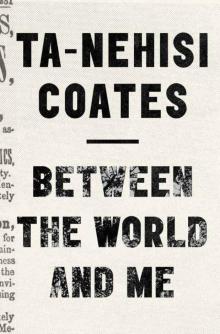 Between the World and Me
Between the World and Me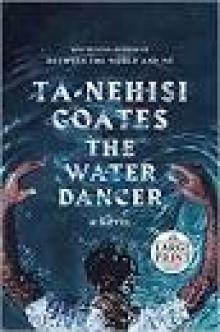 The Water Dancer (Oprah's Book Club)
The Water Dancer (Oprah's Book Club)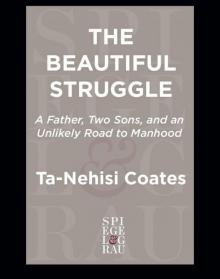 Beautiful Struggle
Beautiful Struggle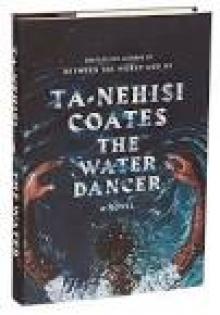 The Water Dancer
The Water Dancer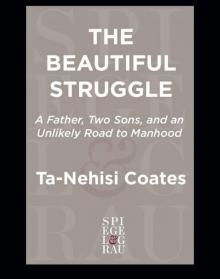 The Beautiful Struggle
The Beautiful Struggle